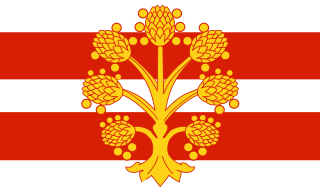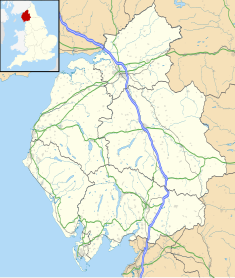
Westmorland is an area of North West England which was historically a county. People of the area are known as Westmerians. The area includes part of the Lake District and the southern Vale of Eden.

In the United Kingdom, a listed building is a structure of particular architectural or historic interest deserving of special protection. Such buildings are placed on one of the four statutory lists maintained by Historic England in England, Historic Environment Scotland in Scotland, Cadw in Wales, and the Historic Environment Division of the Department for Communities in Northern Ireland. The classification schemes differ between England and Wales, Scotland, and Northern Ireland. The term has also been used in the Republic of Ireland, where buildings are protected under the Planning and Development Act 2000, although the statutory term in Ireland is "protected structure".
Brutalist architecture is an architectural style that emerged during the 1950s in the United Kingdom, among the reconstruction projects of the post-war era. Brutalist buildings are characterised by minimalist constructions that showcase the bare building materials and structural elements over decorative design. The style commonly makes use of exposed, unpainted concrete or brick, angular geometric shapes and a predominantly monochrome colour palette; other materials, such as steel, timber, and glass, are also featured.

Albert Square is a public square in the centre of Manchester, England. It is dominated by its largest building, the Grade I listed Manchester Town Hall, a Victorian Gothic building by Alfred Waterhouse. Other smaller buildings from the same period surround it, many of which are listed.

New Hall Manor is a medieval manor house, now used as a hotel, in Sutton Coldfield, West Midlands, England.

Clifton is a small linear village and civil parish in Cumbria, England. Historically part of Westmorland, it lies 3 miles (4.8 km) south east of Penrith.

Eamont Bridge is a small village immediately to the south of Penrith, Cumbria, England.

Yanwath and Eamont Bridge is a civil parish in the Eden District of Cumbria, England, consisting of the small village of Yanwath and most of the neighbouring village of Eamont Bridge. In the 2001 census it had a population of 457, increasing to 535 at the 2011 Census.

Yanwath is a village in the Westmorland and Furness District of Cumbria, England, 1 mile south of Penrith.

Baguley Hall is a 14th-century timber-framed building in Baguley, Greater Manchester, England.
The Grade I listed buildings in Cheshire, excluding those in the city of Chester, total around 80. Almost half of these are churches that are contained in a separate list.
This is a list of Grade I listed buildings in Lancashire, England.
Thomas Dudley was an English politician.

There are 48 Grade I listed buildings in Greater Manchester, England. In the United Kingdom, the term listed building refers to a building or other structure officially designated as being of special architectural, historical or cultural significance; Grade I structures are those considered to be "buildings of exceptional interest". In England, the authority for listing under the Planning Act 1990 rests with Historic England, a non-departmental public body sponsored by the Department for Culture, Media and Sport.

There are over 20,000 Grade II* listed buildings in England. This page is a list of these buildings in the county of Nottinghamshire, by district.
There are over 20,000 Grade II* listed buildings in England. This page is a list of these buildings in the unitary authority of Cheshire West and Chester.

The Moot Hall is a prominent historic building situated at the southern end of Main Street in Keswick, Cumbria, England. It is Grade II* listed.

Eamont Bridge is a road bridge over the River Eamont, at the village of the same name, immediately to the south of Penrith, Cumbria, England. It is a scheduled monument and a grade I listed building.
Barton and Pooley Bridge is a civil parish in Westmorland and Furness, Cumbria, England. The parish is on the edge of the Lake District National Park, and had a population of 232 according to the 2001 census, increasing slightly to 238 at the 2011 Census. The parish includes the village of Pooley Bridge, the small hamlet of Barton, and part of Ullswater, and extends south as far as Loadpot Hill. It has an area of 16.95 square kilometres (6.54 sq mi) and a 2011 population density of 14/sqkm (36/sqmi). The parish was renamed from "Barton" to "Barton and Pooley Bridge" on 1 April 2019.
Richard Dudley of Yanwath (1518–1593) was an English landowner involved in copper and silver mines in the north of England from 1570 onwards.













